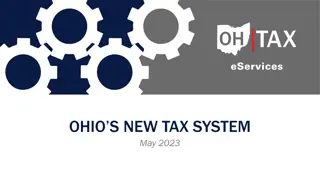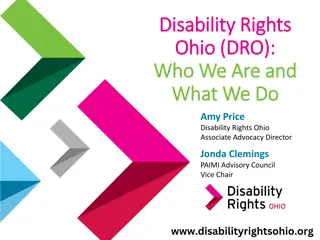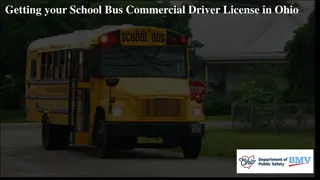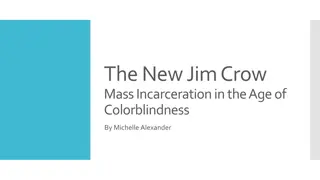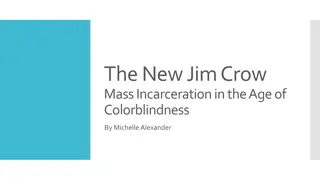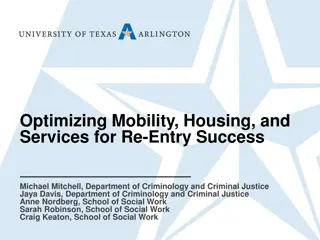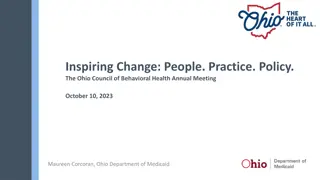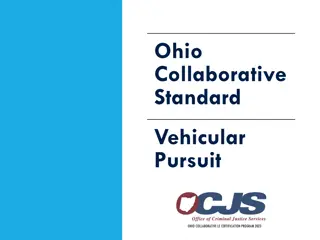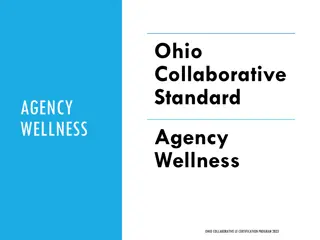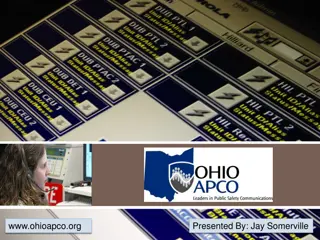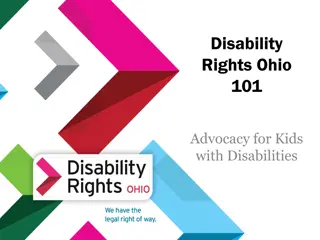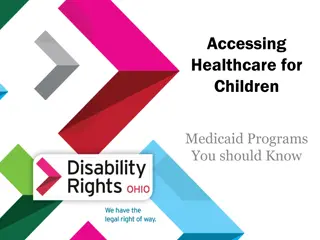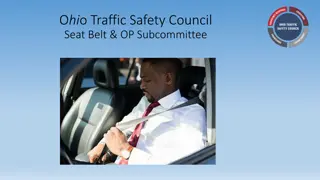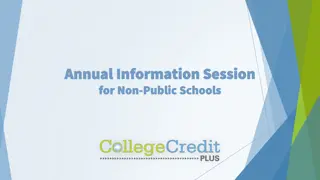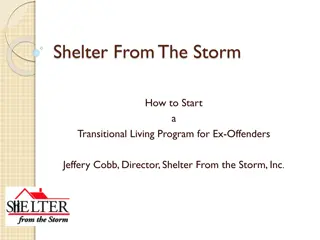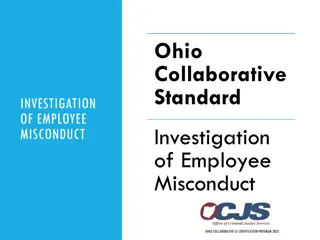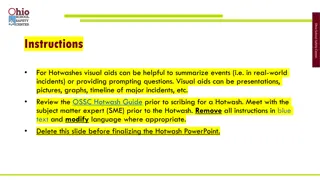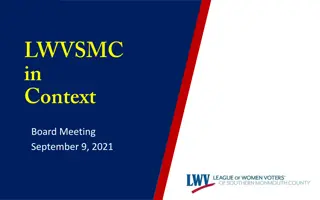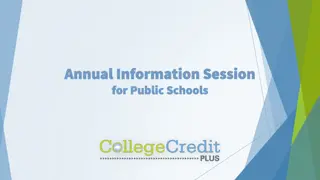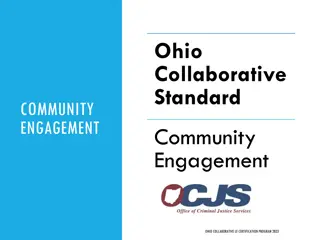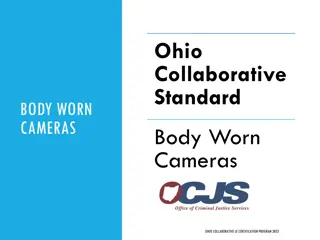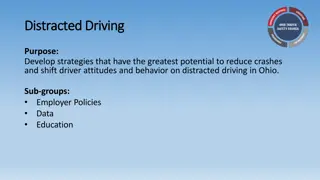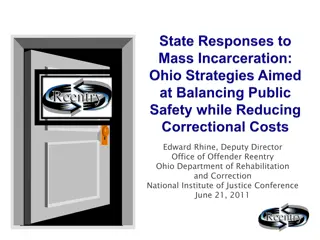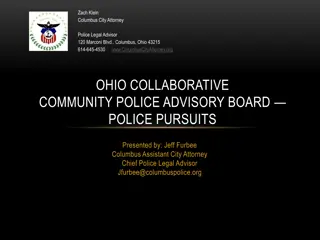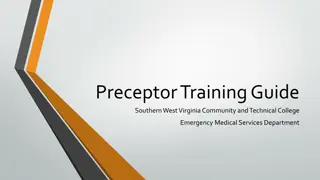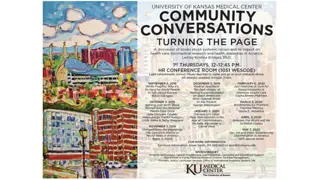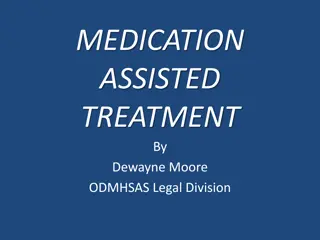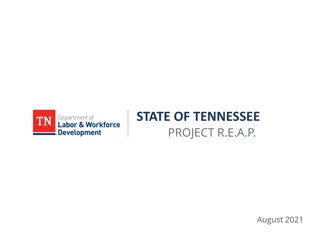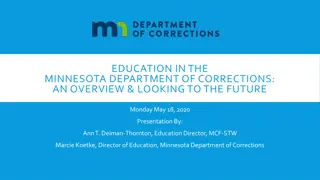Comprehensive Guide to Preparing for Incarceration in Southern Ohio
This informative guide provides essential information on preparing for incarceration in the Southern District of Ohio. Topics covered include voluntary surrender, inmate designations, personal property regulations, treatment services, and more. By understanding these details, individuals and their families can better navigate the challenges of imprisonment and make the most of available opportunities.
Download Presentation

Please find below an Image/Link to download the presentation.
The content on the website is provided AS IS for your information and personal use only. It may not be sold, licensed, or shared on other websites without obtaining consent from the author. Download presentation by click this link. If you encounter any issues during the download, it is possible that the publisher has removed the file from their server.
E N D
Presentation Transcript
United States Pretrial Services Southern District of Ohio
Pre-Entry Class FROM COMMUNITY TO CONFINEMENT
Purpose If you are facing a term of imprisonment, you need to not only prepare yourself, but also your loved ones for what is to come with the life of incarceration. Information provided within this presentation can help ease fears and assist in preparing for what lies ahead. Failing to prepare for your term of incarceration will only make the transition more difficult and prevent you from taking advantage of the opportunities available.
Contents Voluntary Surrender Designations Personal Property Inmate Money Visitation Correspondence Telephone E-mail Mail
Contents Continued Treatment Services Mental Health Substance Abuse Medical Care Education, Work Programs & Inmate Skills Child Support Selective Service Sentencing Computations Questions and Discussion
Voluntary Surrender Voluntary Surrender (VS) is at the discretion of the sentencing judge The defendant surrenders directly to the designated institution. Upon surrendering, you may retain the following: Plain wedding band (no stones or intricate markings) Earrings for females only (no stones or intricate markings) Medical or orthopedic devices Legal documents Social Security card and other forms of identification (driver s license, passport, etc.) These items will be held in the Inmate Central File until release Religious items Must be approved by the Warden Must not present a threat to the security of the institution Religious medallions and chains must be valued at less than $100 Prescription glasses
Designations The Bureau of Prisons (BOP) reviews all sentencing material to determine the appropriate institution Designations are based on: Level of security and staff supervision the inmate requires Level of security and staff supervision the institution provides Medical classification care level of inmate and care level of the institution Inmate program needs (substance abuse treatment, educational/vocational training, individual and/or group counseling, medical/mental health treatment) Various administrative factors (bed space capacity, inmate s release residence, judicial recommendations, separation needs, etc.)
Personal Property The BOP limits the amount of property inmates may have for security, safety, and sanitation reasons Inmates can only possess the following: Items authorized to retain upon admission Items issued by authorized staff Items purchased from the commissary Items purchased or received which have been approved the institution s staff All other items will be considered contraband
Inmate Money Individual inmate Commissary accounts allow the BOP to maintain inmates money while incarcerated Family, friends, or other sources can deposit funds Funds can be utilized to purchase items from the commissary, phone calls, email, etc. Funds are deposited by: United States Postal Service (Mail) Western Union (Electronically) MoneyGram (Electronically) Deposit transactions must have the inmate s full name and register number The BOP will reject funds without valid information Money Order ONLY no cash or personal checks
Visitation The BOP encourages visiting to help inmates maintain ties to the community and boost morale Face-to-face visits are permitted with approved family, friends and others from the community Each institution has visiting guidelines and restrictions which will be provided to inmates and visitors Each inmate is allotted at least four hours of visiting time per month Confidential visits are permitted with attorneys
Visitation Continued Visitors must be pre-approved by the institution for each inmate Visitors with criminal backgrounds will be considered to be allowed to visit on a case-by-case basis Institutions may make special accommodations for families with special circumstances (health problems, etc.) Children under age 16 must have a parent or guardian approve their placement on the visiting list No pets allowed unless the animal is assisting a visitor with their disability Inmates are not permitted to actively engage in a business while in prison
Visiting Day Visitors must present a photo identification and sign the visitor s log The visitor will be required to review and acknowledge the institution s visiting guidelines and sign a statement declaring they do not possess any items which may pose a security threat to the institution The institution will provide a list of authorized items permitted in the visiting room and provide storage for unauthorized items (car keys, cell phone, etc.)
Visiting Day Continued Staff will be present at all times during the visitation All visitors may be searched by staff if deemed necessary All visitors should wear clothing that is appropriate for large gatherings of men, women, and young children Limited physical contact between the inmate and visitor is permitted, but must be in good taste (hugs and kisses) Any act in violation of the institutional guidelines could result in sanctions or criminal charges for the inmate, visitor, or both The inmate you plan to visit should tell you the visiting schedule for their facility, but if you have questions, contact that facility directly
Correspondence Telephone Inmates must have an established telephone contact list before being permitted to make calls The inmate pays for the telephone calls All telephone conversations are monitored and signs are posted by each phone as a reminder Unmonitored calls to attorneys may be permitted No additional arrangements will be made
Correspondence Continued E-mail The Trust Fund Limited Inmate Computer System (TRULINCS) allows inmates to send and receive e-mail TRULINCS allows text only correspondence in a secured manner between inmates and the general public Each inmate must be approved to use the system and each person that an inmate wants to communicate with must give their permission to do so All e-mail correspondence is subject to monitoring by the institution No internet access is available for inmates
Correspondence Continued Mail Correspondence is classified as either General or Special mail General mail is opened by the staff and inspected Special mail is opened in the presence of the inmate, inspected for contraband, and the contents verified Inmates may subscribe to and receive publications as long as they do not negatively impact security, discipline, or good order of the institution, and do not facilitate criminal activity.
Treatment Services Substance Abuse Treatment Inmates are required to participate in courses if: Alcohol or drugs contributed to the commission of the offense Supervised release violations were based on alcohol or drug use Sentencing judge makes a recommendation for treatment Types of Treatment Drug Abuse Education Provides basic information regarding substance abuse and its effects Stepping stone for more appropriate treatment
Treatment Services Continued Substance Abuse Treatment Non-Residential Treatment 12-week, Cognitive Behavioral Therapy (CBT) program for inmates with shorter sentences, less severe drug problems, or waiting for entry into RDAP Residential Drug Abuse Treatment Program (RDAP) Program is voluntary Program participants are housed together in a separate prison unit reserved for the treatment program Program requires a half-day of intensive programming five days a week for a total of nine months Program graduates may receive up to a one year sentence reduction
Treatment Services Continued Mental Health Treatment Counseling is offered in individual and group settings Informal counseling is also available The BOP staff includes psychologists and psychiatrists The BOP provides suicide education to staff and inmates Family members or friends are encouraged to contact the institution if they believe an inmate is in a state of crisis
Medical Care Provides essential medical, dental, and mental health (psychiatric) care consistent with accepted community standards The BOP uses licensed and accredited medical care providers who are supported by community consultants and specialists The BOP operates medical centers for inmates with chronic or acute medical conditions Inmate health is emphasized through examinations, counseling and education regarding nutrition and diet, the effects of medication, and infectious disease prevention Environmental health is promoted through the emphasis on maintaining safe living and working areas
Education, Work Programs & Inmate Skills Education All institutions offer literacy, English as a Second Language, parenting, wellness education, and adult continuing education classes Inmates who do not have a high school diploma or GED must participate in the literacy program for at least 240 hours, or until they obtain their GED Instruction in leisure-time activities, recreation, parenting, and wellness Some traditional college courses Library services are available Occupational and vocational training programs are also available
Education, Work Programs & Inmate Skills Continued Inmate Skills Development Focus is to build the skills essential to successful reintegration Developed to: Identify inmate s strengths and weaknesses Track the inmate s process on their individualized plan Links inmates with programs which meet their specific needs Improve information flow between all parties focused on the same outcomes (inmate, court, probation, case manager) Assist in program resource allocation
Education, Work Programs & Inmate Skills Continued Occupational Training includes exploratory, marketable skill, and apprenticeship level courses Exploratory course provides an introduction to similar occupations Marketable course provides employment skills at the entry level Apprenticeship training prepares the inmate for the achievement of a journeyman s certificate Areas include HVAC, Business, Computer Applications etc. Advanced Occupational Education programs often lead to one- year certificates or two-year degrees Inmates should discuss their educational goals with their case manager and education representative to learn about available opportunities at each institution
Education, Work Programs & Inmate Skills Continued Work Programs All medically able inmates are required to work Work assignments which service the institution Kitchen work crew, Landscaping etc. Inmates earn 12 to 40 cents per hour Federal Prison Industries (UNICOR) Employs and provides job skill training to the greatest number of inmates within the BOP by producing quality goods and services for sale Only produces products for the federal government Helps inmates acquire marketable skills in such areas as metals, furniture, electronics, textiles, and graphic arts High School diploma or GED required for most jobs Inmates earn up to $1.15 per hour The Inmate Financial Responsibility Program allows inmates to pay off financial responsibilities while incarcerated
Child Support Child support orders are not automatically reduced or stalled during incarceration To reassess the amount ordered, inmates can contact their county child support enforcement agencies to request a case review Franklin County: support.franklincountyohio.gov Other Ohio counties: jfs.ohio.gov Inmates may have a portion of their income deducted for child support; this is not done automatically, but rather upon request
Selective Service In the US, men ages 18-26 are required by law to register for Selective Service Inmates are not required to register during incarceration Males under 26 years old must register within 30 days of their release from prison Information on how to register: www.sss.gov
Sentence Computations The BOP calculates inmate sentences in accordance with Federal Statute and BOP regulations Inmates can inquire about their sentence computation with the institution staff Inmates can file appeals of their computation through the Administrative Remedy process 54 days of good conduct credit can be earned for each full year served
Questions and Discussion Refer to the BOP website: www.bop.gov Contact the United States Pretrial Services Office 614-719-3070



